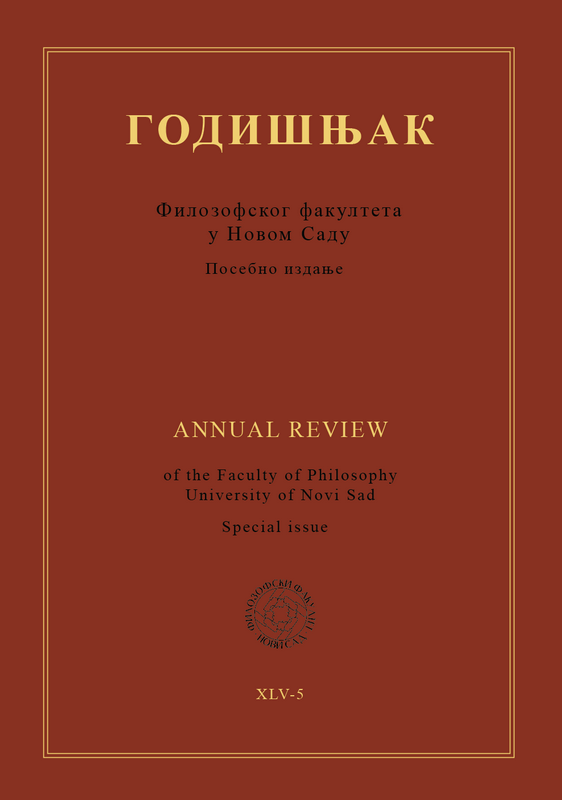HOW UNIVERSITY TEACHERS OF ENGLISH FOR SPECIFIC PURPOSES AND THEIR STUDENTS EMPLOY DICTIONARIES IN TEACHING AND LEARNING
Main Article Content
Abstract
This paper explores how tertiary level teachers of English for Specific Purposes (ESP) and their students use dictionaries in ESP teaching and learning. The study included 21 ESP teachers and 705 students from the University of Novi Sad. Data were gathered by conducting a questionnaire (one for teachers and one for students) and an interview. The teachers’ questionnaire had 45 questions, whereas the students' contained 60 questions. Of these, 16 questions were identical and the answers to them were compared using ANOVA. The results reveal that the teachers’ and students’ views of dictionary use differ significantly with respect to 11 questions. The students primarily use online bilingual dictionaries and tools, whereas the teachers prefer monolingual dictionaries in the form of mobile phone applications. Dictionaries were primarily used for finding word meanings, with students failing to understand all lexicographic information. The results necessitate that both students and teachers receive training in dictionary use and that dictionaries become an obligatory teaching and learning resource.
Downloads
Metrics
No metrics found.
Article Details
References
Allen, E. & Seaman, C. (2007). Likert scales and data analyses. Quality Progress, 40(7), 64-65.
Asher, C. (1999). Using dictionaries in the GCSE examination of modern foreign languages: Teachers’ views and learners’ performance. Studies in Modern Language Education, 7(1), 59-67.
Atkins, S. (1998). Introduction. In: Atkins, S. (Ed.) (1998). Using Dictionaries: Studies of Dictionary Use by Language Learners and Translators. Tübingen: Max Niemeyer Verlag. 1-5.
Atkins, S & Varantola, K. (1998). Monitoring dictionary use. In: Atkins, S. (Ed.) (1998). Using Dictionaries: Studies of Dictionary Use by Language Learners and Translators. Tubingen: Max Niemeyer Verlag. 84-122.
Augustyn, P. (2013). No dictionary in the classroom: Translation equivalents and vocabulary acquisition. International Journal of Lexicography, 26(3), 362-285. DOI: 10.1093/ijl/ect017
Béjoint, H. & Moulin, A. (1987). The place of dictionary in an EFL programme. In: Anthony, C. (Ed.) (1998). The Dictionary and the Language Learner: Papers from the EURALEX Seminar at the University of Leeds. Tübingen: Niemeyer. 97-114.
Campoy-Cubillo, M. C. (2015). Assessing dictionary skills. Lexicography, 2(1), 119-141. DOI: 10.1007/s40607-015-0019-2.
Chambers, G. (1999). Using dictionaries in the GCSE examination of modern foreign languages: Pupils’ perceptions. Studies in Modern Language Education, 7(1), 68- 85.
Chi, M. L. A. (1998). Teaching dictionary skills in the classroom. In: Fontenelle, T.-Hiligsmann, P.-Michiels, A.-Moulin, A. & Theissen, S. (Eds.) (1998). Euralex’98 Proceedings. Papers Submitted to the Eighth EURALEX International Congress on Lexicography in Liège, Belgium. Liège: Université de Liège, Départements d’anglais et de néerlandais. 565-577.
Chi, M. L. A. (2003). An Empirical Study of the Efficacy of Integrating the Teaching of Dictionary Use into a Tertiary English Curriculum in Hong Kong. Hong Kong: Language Centre, Hong Kong University of Science and Technology.
El-Sayed, A. A. A. & Siddiek, A. G. (2013). Review of EFL learners' habits in the use of pedagogical dictionaries. English Language Teaching, 6(8), 54-65. DOI: 10.5539/elt.v6n8p54
Hou, H-I. (2014). Teaching specialized vocabulary by integrating a corpus-based approach: Implications for ESP course design at the university level. English Language Teaching, 7(5), 26-37. DOI:10.5539/elt.v7n5p26
Knežević, Lj.-Miškeljin, I.-Halupka-Rešetar, S. (2019). Upotreba rečnika u nastavi engleskog jezika struke iz ugla nastavnika [The use of dictionaries in teaching English for specific purposes from the teachers’ perspective]. In: Gudurić, S. & Radić Bojanić, B. (Eds.) (2019). Jezici i kulture u vremenu i prostoru 8 [Languages and Cultures in Time and Space 8]. Novi Sad: Filozofski fakultet. 489-494.
Krajka, J. (2007). Online lexicological tools in ESP – towards an approach to strategy training. Scripta Manent, 3(1), 3-19.
Leaney, C. (2007). Dictionary Activities. Cambridge: Cambridge University Press.
Miller, J. (2008). Teachers and dictionary in Australia: Is there a need to train the trainers? TESOL in Context, 17(2), 11-19.
Milić, M. (2015). Creating English-based sports terms in Serbian: Theoretical and practical aspects. Terminology, 21(1), 1-22. DOI: 10.1075/term.21.1.01mil
Milić, M.-Glušac, T. & Kardoš. A. (2018). The effectiveness of dictionary-aided teaching standardization of English-based sports terms in Serbian. Lexikos, 28, 262-286. DOI: 10.5788/28-1-1465
Milić, M.-Sadri, F. & Glušac, T. (2019a). The pedagogical potential of a bilingual specialized dictionary in tertiary education. EQOL Journal 11(1), 51-58. DOI: 10.31382/eqol.190606
Milić, M.-Sadri, F. & Glušac, T. (2019b). The pedagogical potential of a user-friendly specialized dictionary in function of adopting a healthy lifestyle. BMC Sports Science, Medicine and Rehabilitation, 11(7), 5.
Nesi, H. (1999). The specification of dictionary reference skills in higher education. In: Hartmann, R. (Ed.) (1999). Dictionaries in Language Learning. Recommendations, National Reports and Thematic Reports from the TNP Sub-Project 9: Dictionaries. Berlin: Free University Berlin. 53-66.
Prćić, T. (2018). Ka savremenim srpskim rečnicima, Prvo, elektronsko, izdanje [Towards Modern Serbian Dictionaries. First Digital Edition]. Novi Sad: Filozofski fakultet.
Ramagoshi, R. (2004). The use of dictionaries in the light of language teaching methods. Lexikos, 14, 253-263.
Scofield, P. (1982). Using the English dictionary for comprehension. TESOL Quarterly, 16(2), 185-194.
Tarp, S. (2012). New experiences in pedagogical lexicography: Two Cuban school dictionaries. Hermes - Journal of Language and Communication in Business, 48, 95-107. DOI: 10.7146/hjlcb.v25i48.97428
Tono, Y. (2001). Research on Dictionary Use in the Context of Foreign Language Learning. Focus on Reading Comprehension. Tübingen: Max Niemeyer Verlag.
Yamaizumi, M. (2014). Teaching English-Japanese dictionary use in university remedial courses. Komaba Journal of English Education, 5, 1-28. Available at http://park.itc.u-tokyo.ac.jp/eigo/KJEE/005/001-028.pdf. Accessed: 13 November 2019.




